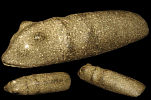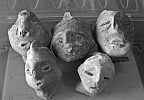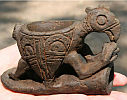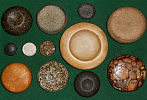|
See these, and more, in this issue of the Central States Archaeological Societies Journal

Click to enlarge |
This hardstone tool shown in three views is in the form of
a chisel, and seems to depict some sort of creature. The owner suggested
a weasel. It could be, or perhaps a salamander or? Obviously its ancient
maker took considerable time to craft the image. Hardstone forms like this are very rare.
Collection of Mitch Lewis, Salem, Illinois |

Click to enlarge |
A group of five pottery heads found by Roger Rushing at the McCleod Bluff Site in Hickman County, Kentucky. These were once attached to the rims of bowls, and easily break off over time. It has been suggested
that they represent mythological figures such as the “Hero Twins” and not individuals. The one at the bottom far left appears to either be wearing a hat or have a “Mohawk” style haircut. It is possible the same prehistoric potter made all of these due to their similarity. Besides heads like this, bowls were decorated with birds, animals and fish.
Collection of Ron Smith,
Calvert City, Kentucky |

Click to enlarge
|
The intact Mississippian Period vulture effigy pottery pipe found in
Lee County Georgia. One can still see remnants of red ochre on it. It measures approximately four inches in length. Note
the cross and circular decorations on the wing. |

Click to enlarge |
A group of discoidals, the largest measuring 4¾ inches
in diameter. A wide variety of forms and materials were utilized, presumably to further the players luck as well as enhance the
performance of the discoidal. The smaller forms may possibly have been utilized to “count” the players game as “markers” and
may have represented the larger forms in miniature. Or they may have been utilized in another game altogether. Materials shown include quartzite,
galena, conglomerate and granite, and styles include Salt River, Cahokia Cupped, Tennessee and Biscuit. |
HOME
|
|




